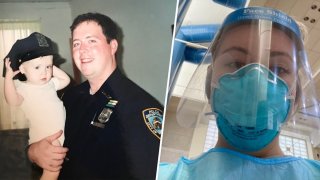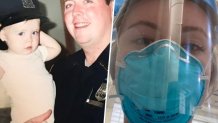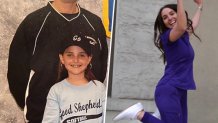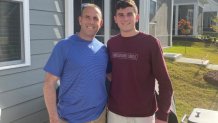
WATCH ANYTIME FOR FREE
Stream NBC10 Boston news for free, 24/7, wherever you are. |
Two decades after the Sept. 11 terrorist attacks, a new generation of health care workers is taking care of the police officers and firefighters who became sick after rushing in to help.
Some nurses and doctors were inspired to go into medicine by their first responder parents, whose cancers, lung problems, heart disease and other illnesses showed up years after working in the World Trade Center “pile” — the smoldering rubble of the fallen towers — and other toxic sites.
Get updates on what's happening in Boston to your inbox. Sign up for our News Headlines newsletter.
Three adult children of 9/11 first responders recently talked with TODAY about their decision to enter medicine and become helpers themselves — working as or training to be nurses.
All are scholarship recipients of the First Responders Children's Foundation — which provides financial support, including help with college tuition, to kids who have lost a parent in the line of duty and to families enduring financial hardship because of the death.
‘He was very proud of me’

“My mom always says that she was the glue and he was the glitter because he was the one who took us to all of our annoying One Direction concerts,” Miah Hunt, 21, said of her late father, NYPD Sgt. Jeremiah Hunt.
“He just was very present in our lives.”
Sgt. Hunt spent most of his time at ground zero in the months following 9/11, going into the city for days at a time because responders were needed at “the pile” so badly, she said.
Almost two decades later, Sgt. Hunt went to the dentist because of pain in his mouth. It turned out to be a tumor — squamous cell carcinoma of the tongue, a debilitating cancer that required surgery in 2018, impacting his ability to eat, drink and speak, Miah Hunt said.
Doctors connected the cancer directly to her father’s work during the 9/11 recovery efforts, she noted. World Trade Center first responders are at increased risk for head and neck cancers, a recent study found.
Sgt. Hunt died in 2019 at the age of 50. Miah Hunt, who grew up watching her dad undergo successful treatment for a separate, unrelated cancer, only to see him become devastated by the second diagnosis, said nurses always made a difference in his care.
“That really inspired me to want to go into health care and to provide (care to) people and hopefully be the nurse who people go home and be like, ‘Oh, I had a great nurse. She made it easier for me,’” she told TODAY. “I think it would be super full circle to end up working with the nurses who cared for my dad.”
Miah Hunt graduated from West Virginia University with a nursing degree in May. Her goal is to work at NewYork-Presbyterian Hospital, where her father was treated. He loved to tell the nurses his daughter was in nursing school.
“He was very proud of me,” she said. “Firefighters and first responders are still being affected by these cancers that are just appearing now.”
‘I'm living out his legacy’

Growing up, Samantha Switzer, 25, always wanted to help people — it runs in the family. Hers is full of first responders, including her late father, Bill Switzer, a New York City firefighter.
“I'm living out his legacy through me because I'm a health care worker now,” the registered nurse said.
Her dad got hurt on the job in 1998, suffering broken bones after falling through a floor, and was out on disability, she said.
“That's when he became Mr. Mom because my mom had to work full-time and my dad took care of me and my brothers, so he would decorate the house for every holiday, he would make cupcakes for school parties,” Samantha Switzer said. “He was also our coach for everything.”
After hearing about the 9/11 terrorist attacks, Bill Switzer raced to ground zero: “I need to go down to that pile to help my brothers and sisters to look for bodies,” the family recalled him saying. He worked there for weeks.
His daughter remembers him as always healthy and active, but in May 2017, he went to the doctor for excruciating back pain. A CT scan revealed a mass on his hip linked to renal cell carcinoma, a kidney cancer that had spread throughout his body. Bill Switzer died just 10 months later at the age of 56. Doctors said it was a 9/11-related cancer, his daughter noted.
“Watching my dad go through his illness just opened up my eyes that this is the profession I want to be doing, which is a registered nurse,” she said.
“I knew that I wanted to be at the patient's bedside, and that's why I knew nursing would be best for me.”
Samantha Switzer now works in a hospital in Brooklyn, caring for patients who have cancer and blood disorders, and those recovering from surgery. “The (First Responders Children's Foundation scholarship) support helped me pursue a life of public service and now I get to help other people. I know my father is proud of me."
‘Living up to their expectations’

Thomas Caputo, 19, was born six months after 9/11 into a family devastated by the terrorist attacks.
His grandfather and uncle, both battalion chiefs in the New York City Fire Department, died when the South Tower of the World Trade Center collapsed.
“While I understand I'm never going to attain their level of heroism considering their actions on Sept. 11, I strive to really just be a fraction of it. That's really part of the reason why I chose to pursue a career in the medical field,” said Caputo, who is a nursing student at Villanova University. “I think it would be living up to their expectations.”
Another uncle, who worked as a detective for the NYPD, died of a 9/11-related liver cancer in 2018.
His dad, Charles Caputo — also a detective in the NYPD — worked in “the pile” in the months following the attacks, going through the rubble and looking for IDs and other objects that could provide a sense of closure to families of victims.
“In the immediate aftermath, he didn't have any concerns about his health,” Thomas Caputo said. “It wasn't until fairly recently when he started seeing other people in my family, including my uncle, getting sick that he was starting to get worried.”
When Charles Caputo began experiencing shortness of breath about three years ago, doctors discovered scar tissue on the on the bottom of his lungs. The diagnosis: pulmonary fibrosis, an illness directly linked to his work after 9/11, Thomas Caputo said.
Now 55, he is doing well, his son noted, and is proud of Thomas’ career choice in health care.
“Considering that my uncle had a 9/11-related cancer and now my father is currently suffering, I want to do some sort of research or even help with treatments of 9/11-related illnesses,” Thomas Caputo said.
This story first appeared on TODAY.com. More from TODAY:

